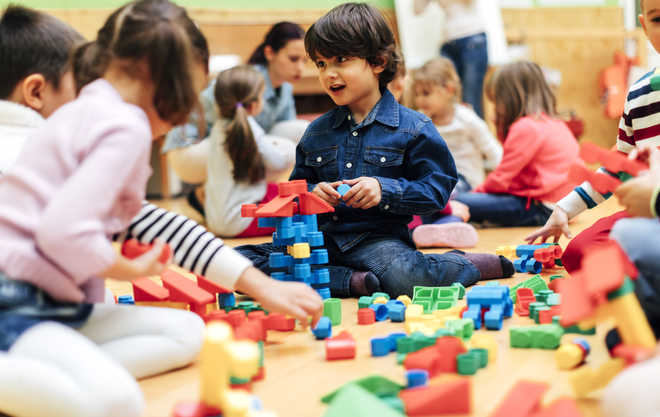
meaningful playtime: Make play dates more structured by picking one activity like building blocks or crafts class
Ruby Ahuja
Doting grandparents love to attend to the toddler all the time. Moms join different activities, from yoga classes to reading groups, with the baby again. Nuclear families prefer to go for a single child. All of these lead to a clingy baby, who will refuse to be in the company of anyone but grandparents and parents.
Your baby may not even want to mingle with other kids her age, because she’s simply not used to seeing other children around. Parents complain about how their child does not share toys and hates to give away even a broken car or doll. It is reassuring to know that all of this is normal. Your child will gradually grow out of it. But to make the process easy for your baby, here are a few ways to bring a smile on your child’s face at a social engagement.
Allow her to do what she likes: If your child doesn’t leave you when you’re out at a social event, don’t force her away. Encourage people to smile at her and talk to her when she’s in your arms. It’s a good idea for you to sit down if she has just begun to crawl or walk. She may want to get out of your arms when she gets used to the surroundings and choose to stand on her own with you by her side. This in itself is a sign of socialising — the fact that she is comfortable in her space. Taking the child to a park everyday either in stroller or for freeplay will also help.
Introduce one person at a time: Rather than throwing large parties at home, invite one person at a time. A lot of relatives and friends at home might annoy the child. Help the guest with toys that your child loves, so that they can play together. Or, if your baby enjoys bubbles, and you want her to get to know your guest, keep a bubble-maker handy. Getting a neighbour over for cup of tea or coffee once a week will introduce your child to her neighbourhood.
Interact as much with your child: From the time your child is a few months old, address her by her name and talk to her. Try different ways of conversation: Explanations about things (“This is a red block”), instructions (“Please put the bottle on the table”), yes-no questions (“Would you like some water?”). Also involve your child in dinner-table conversation, so she feels a part of the family. If the child is quietly playing, asking child frequent question like “what are you playing?’, “What colour block is this?” etc. also helps the child learn socialising.
Do an activity date, not a play date: Make play dates more structured by picking one activity. You can set up a tent and have the kids take in little pillows and blankets. Blocks are another way of introducing children to the concept of playing together. If they are very young — about 18-24 months — they may perform what is called parallel play, where they use the blocks to build their separate structures. This is fine, because the children are still sharing the activity piece.
Invite a small gathering to a birthday party: First birthday of a child is very special for parents. To celebrate that, they invite a huge gathering of their friends. While this may make for delightful photos later in life, your child may not enjoy it. Instead, gather a small bunch of your friends and their children. Ensure that the party doesn’t last more than a couple of hours. If you need to do three small parties rather than one large, that’s fine.
At times, leave your child with the father: Leaving the child with father on a Sunday afternoon should be done frequently. This will help the father to understand the child’s needs and will strengthen the bond. Also it will help the mother take a break. As with all things, ease your baby into the process. Leave her for five minutes while you just stand outside the room. Then increase this to 10 minutes. Just reassure the child that you will come back into the room.
Speak to the teacher about volunteers: Ask your child’s teacher if it’s possible to introduce some parents as teachers for a day or so. Nurture a sharing and caring child, who has good interpersonal skills, can have a conversation, and has learnt emotional self-control.
—The writer is a consultant, clinical psychology, Paras Bliss Hospital, Panchkula.
When to stop
Socialising is great, but you must know where to draw the line as well. Avoid insisting that your child must hug or kiss adults or older children. Be clear about who to trust and only leave your child alone with a person she seems comfortable with. Too much socialising will also spoil your child as she won’t learn to play all be herself.



























